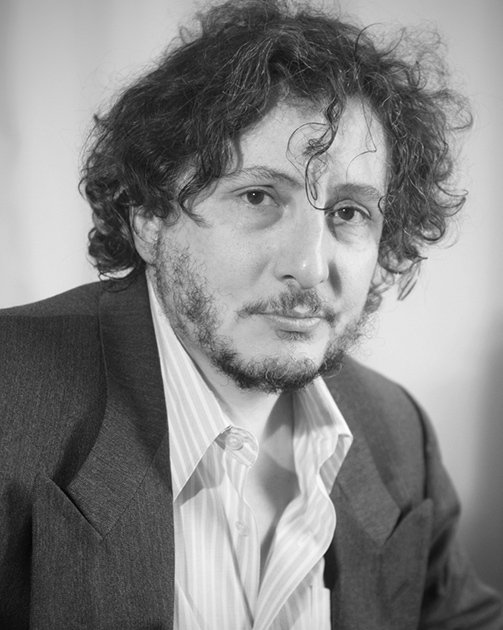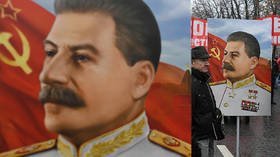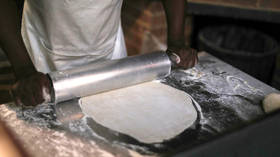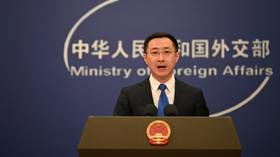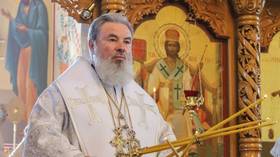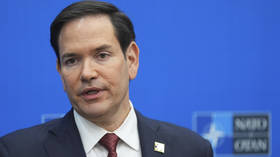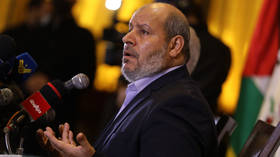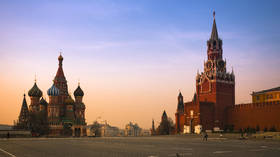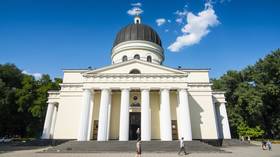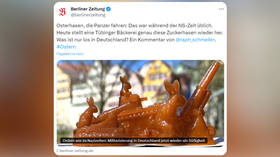It’s NOT ‘rehabilitating Stalin,’ but mainstream media portrays Russia as VILLAIN to trigger alarm
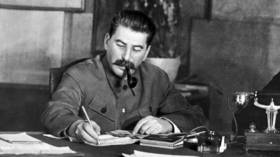
Western media’s misleading claim that Russia is glorifying Soviet dictator Joseph Stalin serves an obvious purpose: to prompt urgent calls from its readers for foreign intervention.
Russia is not rehabilitating Stalin. However, Western commentators who purport to be so concerned about this unlikely prospect would do well to wonder about the wisdom of policies toward Russia that cause ordinary Russians to look back with admiration on a leader who, whatever his crimes, protected them from foreign aggressors.
The echo chamber of contemporary Western commentary on Russia has long resounded with the claim that Russia is in the process of such a rehabilitation. Such claims long pre-date President Putin’s recent National Interest article, which defended the Molotov-Ribbentrop non-aggression pact as Stalin’s reasonable response to the Western powers’ appeasement policy toward Nazi Germany.
A Times of Israel piece recently asked: “Why is the Kremlin promoting his [Stalin’s] image today, and how will this propaganda continue to affect and shape modern Russia?....Will Stalin, the brutal dictator who built a sophisticated machine of death, torture, and forced labor to promote his nationalist agenda, be normalized and accepted by the Russian people and establishment?”
According to a recent Washington Post column, Stalin “is at the core of Russian perceptions of the glorious past. The Kremlin has done nothing to halt the creeping rehabilitation of Stalin; in fact, it is happy to encourage the cliches of Soviet success wherever it can. Putin’s historical rhetoric increasingly echoes Stalin’s.”
“Vladimir Putin’s Russia Is Rehabilitating Stalin. We Must Not Let It Happen,” screamed the headline of a column in the Guardian.
A Washington Post story, under the headline “Putin’s Dangerous Campaign to Rehabilitate Stalin,” claimed “the Russian president is actively rehabilitating the Soviet dictator’s record, working to paint him as a strong leader who saved the world from fascism. The goal is to bolster Putin’s own “strongman” leadership style in the eyes of ordinary Russians.”
Meanwhile, Putin’s “defense of Stalin and the Soviet record threatens to undermine Russian efforts to ease tensions with the West,” writes Bloomberg.
On closer inspection, such stories fall well short of the lurid headlines. Take the tale of the newly constructed Cathedral of the Resurrection of Christ, the opening of which was timed to coincide with the commemoration of the 75th anniversary of victory in World War II. The cathedral was the subject of innumerable articles in the Western media, claiming that it “glorifies” Stalin. Photos of the interior, leaked to the press, showed a mosaic depicting the 1945 victory parade in Red Square, with a crowd of soldiers holding aloft a banner bearing a portrait of Stalin. So, not a portrait of Stalin himself, but a portrait of Red Army soldiers celebrating victory and carrying a Stalin banner.
Either way, by mid-May, Stalin was gone. Bishop Stefan, the cathedral's archpriest, told Interfax that the cathedral would not exhibit the mural in line with the “wish of the head of state.”
Then there are the alleged name changes. According to the Times of Israel, “the capitals of two pro-Russian entities – the self-proclaimed republics of Donetsk and South Ossetia – changed the names of their respective capitals, Donetsk and Tskhinvali, to Stalino and Stalinir.” This horrifying tidbit of news is extremely misleading. The wartime names, “Stalino” and “Stalinir” are only to be used on the few days of the year that commemorate World War II. The same goes for Stalingrad itself. On February 2, May 9, June 22, August 23, September 2 and November 19, the city of Volgograd regains its former name Stalingrad – but only on those days. Clearly, this is about remembrance of the war, not celebration of Stalin.
Also on rt.com Is this huge new cathedral to war Putin’s folly, or a magnificent, unique building that tells a lot about the East-West divide?That the city of Volgograd has not reverted back to its former name is proof that no Stalin rehabilitation is taking place. Stalingrad is, after all, the location of one of the most famous battles in world history.
Restoring the name of Stalingrad would not only be in accordance with the spirit of respect for a country’s history, but would bring in tourists and much-needed revenue. Yet this has not happened, despite the many petitions requesting the name change.
Asked in 2014 whether he would consider renaming Volgograd, Putin replied that it would be up to the city’s residents to decide in a referendum. “We’ll do as the residents say,” he replied. However, there has been no referendum in Volgograd, and opinion polls suggest that only a quarter of the residents would support the name change. Sixty-nine percent of all Russians polled in 2015 opposed restoring the name Stalingrad.
The “Russia is rehabilitating Stalin” stories serve an obvious purpose. For the Western public, Stalin is almost as much of an ogre as Hitler is. Hitler and Stalin are invariably paired as the worst monsters in human history. Consequently, any suggestion that Stalin might be making a vicarious comeback in Russia is bound to trigger alarm and urgent calls for action directed at Russia.
Yet the Western media rarely report that it was Putin – not Khrushchev, Gorbachev or Yeltsin – who built a monument to the victims of Stalin. Opening the Wall of Sorrow memorial to the victims of political repression on Academician Sakharov Avenue in October 2017, Putin declared:
“It is very important that we all, and future generations – this is of great significance – know about, and remember this tragic period in our history, when entire social groups and entire peoples were cruelly persecuted… This terrifying past cannot be deleted from national memory or, all the more so, be justified by any references to the so-called best interests of the people.”
Despite the erection here and there of the odd statue of Stalin (usually on private property), it’s Russia’s extreme reluctance to rehabilitate the former Soviet leader that is remarkable.
With each passing year, the historic significance of Russia’s stunning victory in World War II grows in magnitude, as does the Russian people’s pride in their perseverance and ultimate triumph in the face of unspeakable horror. Yet the man who led the Soviet Union during those years and who was responsible for all of the critical decisions that led to Soviet victory remains a person about whom it is largely impermissible to speak positively in public.
This is an act of great forbearance, for no one disputes who led the Soviet war effort. Western diplomats and military leaders who dealt with Stalin during the wartime years attested to his brilliant decision-making, his tactical and strategic shrewdness and his astute diplomacy.
Consider this description of Stalin as wartime leader by W Averell Harriman, former governor of New York and US ambassador to the Soviet Union during World War II. Some, he said, saw “only the tyrant in Stalin”:
“I saw the other side as well – his high intelligence, that fantastic grasp of detail, his shrewdness and the surprising human sensitivity that he was capable of showing… I found him better informed than Roosevelt, more realistic than Churchill – in some ways, the most effective of the war leaders.”
Consider the words of Field Marshal Lord Alanbrooke, Great Britain’s chief of the imperial general staff during World War II. Stalin, he wrote, possessed “a crafty, brilliant, realistic mind, devoid of any sense of human pity or kindness. Gives one almost an uncanny feeling to be in his presence. But undoubtedly a big and shrewd brain with clear-cut views as to what he wants and expects to get.”
Also on rt.com 27 million reasons why we must remember Victory Day & stand up to attempts at rewriting historyThen there’s the assessment of Alexander Cadogan, permanent under-secretary of state for foreign affairs (the most senior civil servant in the UK Foreign Office) during World War II. Writing to his wife from Yalta, Cadogan said this of Stalin: “He sat there for the first hour and a half or so without saying a word. There was no call for him to do so. The President [Roosevelt] flapped about, the PM [Churchill] boomed, but Joe [Stalin] just sat there, taking it all in and being rather amused. When he did chip in, he never used a superfluous word, and spoke very much to the point.”
In an official minute, Cadogan wrote of Stalin, “he is a great man.” In contrast to such fulsome encomia, Putin’s occasional words of praise for Stalin’s wartime leadership are distinctly milquetoast. For example, in 2014, during a question-and-answer session at the Seliger National Youth Forum, Putin said: “Whatever people might say about the number of victims in World War II and the Great Patriotic War, we did win in the end. We can criticize the commanders and Stalin all we like, but can anyone say with certainty that a different approach would have enabled us to win? No one denies that Stalin was a tyrant and that we had the labor camps and the personality cult, but we need to be able to look at issues from every angle.”
To be sure, in recent years, there has been an increase in respect toward Stalin among the Russian public. The Western media, which eagerly report this, expecting a shiver of horror to pass through their readers rarely wonder why this might be. According to the Moscow Times, “Seventy percent of Russian respondents told the Levada Center in 2019 that Stalin played a positive role for Russia. Stalin’s previous record approval rating stood at 54 percent in 2016.”
The explanation for such poll findings is not hard to find. The first business of government is protection of its people from armed attack. Stalin did that. When he came to power in 1925, the Soviet Union was in ruins. Devastated by civil war, routed militarily by Poland, vulnerable to attack from any and all of its neighbors, and run by a hopelessly divided leadership, the Soviet Union faced very dim prospects for survival.
When Stalin died, in 1953, the Soviet Union was the dominant power in Europe and, with communist China as its junior partner, the dominant power in Asia. Governments not under Soviet rule – those of the United States and Western Europe – lived in terror of coming under Soviet rule.
So, what is Russia’s situation today? Well, NATO has expanded its membership to include every former member state of the Warsaw Pact, not to mention former republics of the USSR, promised membership to Ukraine and Georgia, and conducted almost daily military exercises in the Baltic and Black Seas. The United States has walked away from the Anti-Ballistic Missiles, Intermediate-Range Nuclear Forces and Open Skies treaties. And there is a constant barrage of anti-Russian propaganda emanating from many Western capitals. With all that in mind, perhaps it isn’t surprising that Russians, while they certainly don’t want Stalin back, look with admiration and respect upon a leader who protected them from foreign aggressors.
Think your friends would be interested? Share this story!
The statements, views and opinions expressed in this column are solely those of the author and do not necessarily represent those of RT.
